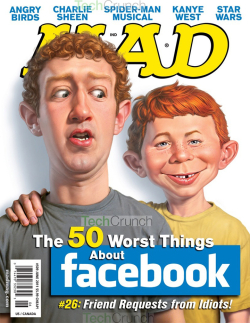 A quarter-century ago, when the Web was being spun, I asked local newspapers how hungry they were to sit at the Internet’s banquet.
A quarter-century ago, when the Web was being spun, I asked local newspapers how hungry they were to sit at the Internet’s banquet.
They weren’t hungry at all.
They took none of my ideas. They laughed at me as an outsider (I was writing online even then) and thought they could “repurpose” their existing print effort to win the online game.
Frankly they deserved what they got. When I read whinging about how local newspapers are failing, or being taken over by politicians for propaganda purposes, I have no sympathy. While I’m a journalist, I was trained as a business journalist, and I have always seen journalism itself as a business.
 No matter what your passion, once you try to make a business of it, you’re in business, and no longer engaged in said passion.
No matter what your passion, once you try to make a business of it, you’re in business, and no longer engaged in said passion.
A writer running a newspaper is like a cook who opens a restaurant. Your job is keeping people who share your passion employed. (That's Dan Whisenhunt, publisher and editor of Decaturish
No matter the size of the business, your business as a businessman remains the same.
Publishers failed because they were bad businessmen, and women. Mostly men.
Enough. It’s 2019. Is there any hope for local journalism as a business?
Yes, there is. But you need to follow some rules.
-
Local, local, local – You don’t care what’s happening in Washington, in the world, or even in the next town over. You care about what’s happening on your patch, and only your patch. That means you no longer publish state stories, national stories or international stories, online or off. You no longer take syndicated content. Let them find their own business model. If people can get it somewhere else, let them.
- Follow the Money – The best niches for local journalism today lie in rich neighborhoods. They want to read about themselves, even though they’re not interesting. Focus your attention there, until you’re profitable enough to look elsewhere.
- The Sliding Paywall – You need traffic to get traction. A paywall guarantees you won’t gain traction. So, you don’t have a paywall. Instead you offer “memberships,” a series of enhanced services (with tiered pricing) and you focus on converting readers. You build an audience and then build events around the products and services they want.
- Advertisers are Business Partners – Stop selling “advertisements.” Seek “business partners” again. Anyone who hands you money is someone whose business you’re now dedicated to. You become their marketing department and use every trick you can find to build their sales. Then you negotiate for a piece of the sale increase. When you put money in someone’s pocket you can ask for a piece of it. Not before.
- One Staff – I was taught there was a “Chinese wall” between editorial and advertising. Tear down that wall. Every remaining local publisher I know who has any success makes everyone working for them a mini-publisher, or publisher-trainee. That means they’re learning the whole business, from finding business partners, to lay-outs, to researching and writing local stories. Local papers, by their nature, are small businesses. Start acting like one.
- Divide to Conquer – If you’re serving a city rather than a town, divide it by location, by beat, by niche. Focus on one piece of the whole until you start seeing some money, then add geographic or focus beats, depending on how much competition there is. National chains are your competition – Nextdoor in community news, Vox in real estate, sports and food. Look for weakness and demonstrate your ability to make money in vacuums. That’s how you build your business, bit by bit, piece by piece.

There are successful Internet publishers. I mentioned two already. Another is Talkingpointsmemo, whose beat is politics. (That's publisher Josh Marshall on the right.) Note that they don’t have a paywall, but membership tiers. Solid stories build their readership and give them something they can upsell. That’s the model if you want to get money out of readers.
If you don’t think you can “beat” Google or Facebook, you’re no longer competing with them. That ship has sailed. They know your reader. They know their name, their address, where they went yesterday both online and off. They sell those specific attributes to advertisers at a run-of-network price. Despite their inefficiency, they make it up on volume because the volume of advertising space online is limitless.
The business of journalism has always been organizing and advocating a place, a lifestyle, or an industry. The publisher of a magazine whose readers run TV stations looks like a small market TV station manager. The successful publisher of a local newspaper is known at all the local Chamber of Commerce and government meetings, by name, because he or she meets them all at every meeting they attend.
Rebuilding local news means working step by step, reader by reader, business partner by business partner. It’s a hands-on job, and you’re a publisher, not a journalist. Even if the only person you’re trying to keep employed is yourself.












Great post which is and eye opener to journalists. Journalism profession has revolutionized with time.
No matter what the journalist is writing, the business aspect of journalism is an obstacle that everyone faces.
Great post which is and eye opener to journalists. Journalism profession has revolutionized with time.
No matter what the journalist is writing, the business aspect of journalism is an obstacle that everyone faces.
Local news is important and Regina has a good point! Loved this thank you.
Local news is important and Regina has a good point! Loved this thank you.